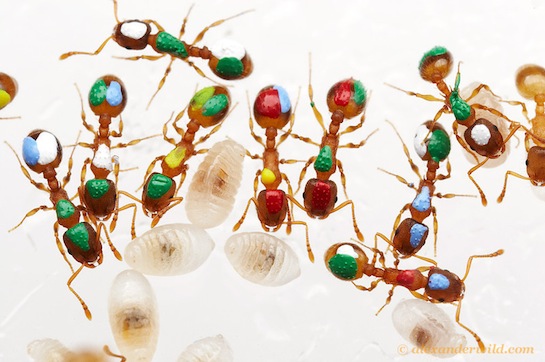
I noted yesterday that Wired was releasing its future staff-shot photos under a Creative Commons license. They’re choosing a “noncommercial” license, but they specifically state that editorial use (by bloggers, websites, or even print publishers) doesn’t count as commercial use in their eyes:
We welcome editorial use by bloggers or any other publisher, but we are not authorizing commercial use, like using one of our photos in an advertisement.
What exactly constitutes commercial use is a controversial topic in Creative Commons circles — but I forgot to mention one small controversy from a few months ago that I think sheds some light on the debate.
Alex Wild is a biologist who blogs about science photography for Scientific American. (He’s also a fine shooter himself. That’s one of his photos above, of Temnothorax rugatulus, marked up with paint to be better tracked in the lab.)
In August, Wild wrote a post detailing why he didn’t use Creative Commons licenses on his photos:
The reason is simple:
I am evilconsumers of Creative Commons licenses do not understand them. In particular, they seem to miss one key bit of information:Creative Commons licences are contracts.
[…]
Creative Commons only functions properly when both content creators and content users have the same understanding of the simplified CC contract. In my experience, content users fail at this more often than not.
He singled out one particular content user who he argued didn’t understand CC’s terms: Wired. He checked the most recent posts on Wired’s science blog using CC-licensed images and found that 80 percent of the images allowed only noncommercial use:
WIRED is a private for-profit entity. Danielle Venton, the author, is a paid blogger. Both earn money from the site’s advertising revenue, which, as you can see from the screen capture, forms a substantial presence on the site. The commercial nature of this context should be uncontroversial. The blogger, to remain compliant with U.S. copyright law, needs to obtain permission for use that goes beyond the stated non-commercial CC license.
Of course, the commercial nature of this context is controversial, or at least not universally agreed upon. In a sense, the question is whether noncommercial means the same thing as nonprofit. A nonprofit institution can still buy and sell things; a for-profit institution can engage in lots of behavior that isn’t explicitly commercial.
Wired isn’t the only for-profit publisher using noncommercial CC images. (And from what I can tell, Wired did not respond in any way to Wild’s post.) Here’s a post complaining about The New Yorker using one, for instance. But it’s interesting to see Wired’s declaration of editorial-use-as-noncommercial within the context of it being criticized for seeing editorial use as noncommercial.